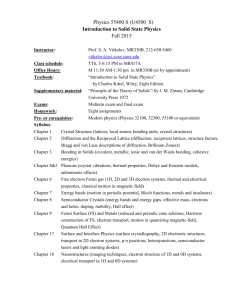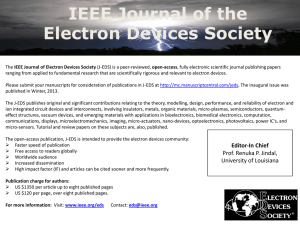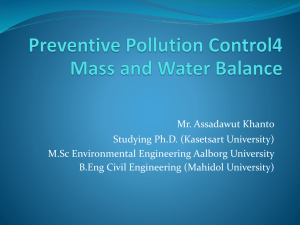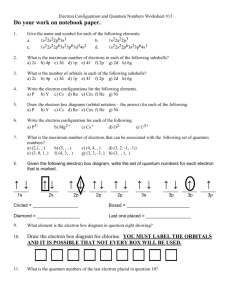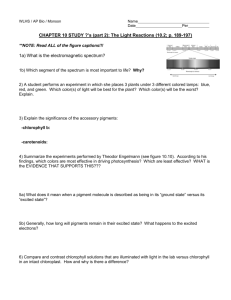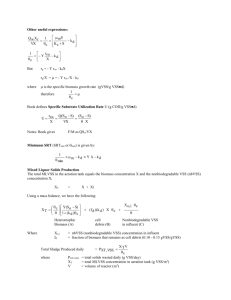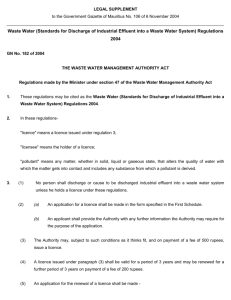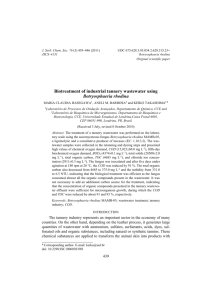CE 532 – Environmental Biotechnology
advertisement
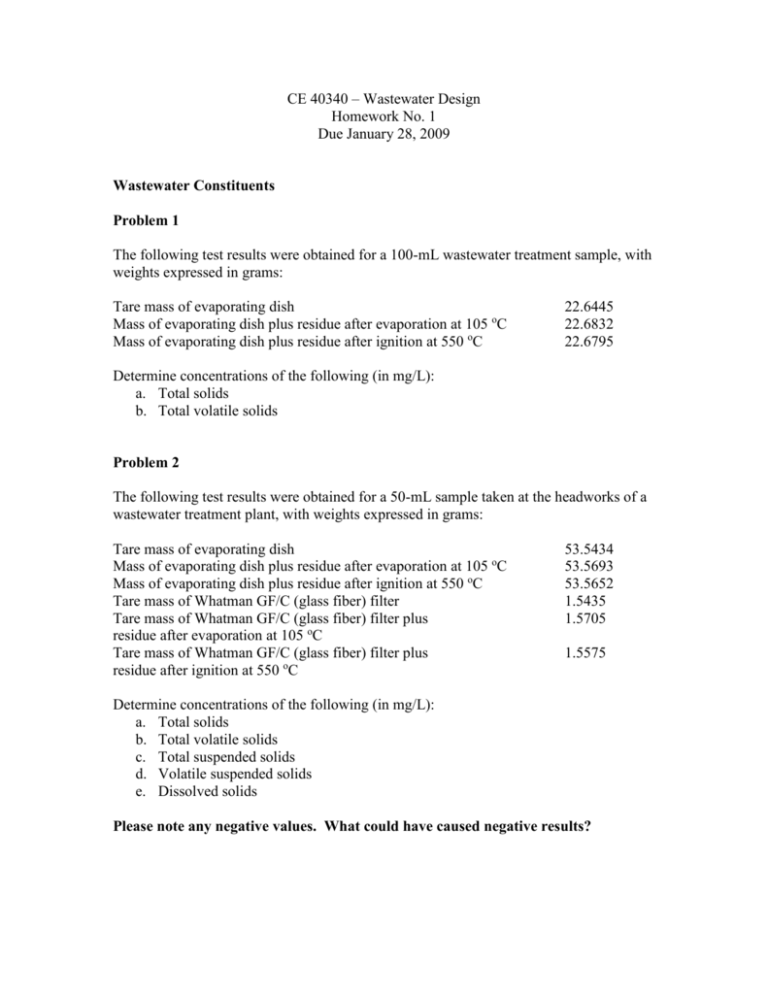
CE 40340 – Wastewater Design Homework No. 1 Due January 28, 2009 Wastewater Constituents Problem 1 The following test results were obtained for a 100-mL wastewater treatment sample, with weights expressed in grams: Tare mass of evaporating dish Mass of evaporating dish plus residue after evaporation at 105 oC Mass of evaporating dish plus residue after ignition at 550 oC 22.6445 22.6832 22.6795 Determine concentrations of the following (in mg/L): a. Total solids b. Total volatile solids Problem 2 The following test results were obtained for a 50-mL sample taken at the headworks of a wastewater treatment plant, with weights expressed in grams: Tare mass of evaporating dish Mass of evaporating dish plus residue after evaporation at 105 oC Mass of evaporating dish plus residue after ignition at 550 oC Tare mass of Whatman GF/C (glass fiber) filter Tare mass of Whatman GF/C (glass fiber) filter plus residue after evaporation at 105 oC Tare mass of Whatman GF/C (glass fiber) filter plus residue after ignition at 550 oC 53.5434 53.5693 53.5652 1.5435 1.5705 1.5575 Determine concentrations of the following (in mg/L): a. Total solids b. Total volatile solids c. Total suspended solids d. Volatile suspended solids e. Dissolved solids Please note any negative values. What could have caused negative results? Problem 3 Estimate the alkalinity, expressed in mg/L as CaCO3, for a wastewater sample with the constituents listed below. Use only the appropriate constituents! The pH of the sample is 7.8. Constituent Ca2+ Mg2+ Fe2+ HCO3SO42ClNO3- (as N) CO32H2CO3 Concentration (mg/L) 127 27 2.5 48 231 115 17 4 0.01 Problem 4 Assuming volatile suspended solids are mostly bacteria, and that bacteria are 12.4% N by weight (i.e., 0.124 gN/gVSS) and 2.5 % P by weight (i.e., 0.025 gP/gVSS), a) Determine the concentration of particulate (suspended) nitrogen and phosphorus in the sample of Problem 2. b) If the dissolved phase has a TKN = 12, NH4+ = 3 mgN/L, NO3- = 5 mgN/L, and NO2- = 0.5 mgN/L, what is the total nitrogen (TN) of the sample? And the total inorganic nitrogen (TIN)? Note that the sample pH is 7.2, so NH3 can be neglected. Problem 5 For the wastewater samples listed below, determine dissolved ultimate BOD (BODL), particulate BODL, particulate COD, total COD, dissolved total nitrogen (TN) and total phosphorus (TP), and particulate TN and TP for primary effluent, secondary effluent (prior to settling), and final effluent (following settling). Assume the dissolved COD is completely biodegradable. Assume fd = 0.8 Primary Effluent Filtered COD (mgCOD/L) Xa (mgVSS/L) Xi (mgVSS/L) TKN (mgN/L) Filtered NH4+ (mgN/L) NO3- (mgN/L) NO2- (mgN/L) Filtered P (mgP/L) Final Effluent 120 Aeration Tank Effluent 5 5 50 28 19 851 730 NA 15 7 6 NA 5 0 0 6 2 1 4 2 1 4 5 Problem 6 Using Table 7-7 (pg. 572) of the M&E textbook, write the half reactions, overall reactions, and Gibb’s free energy for the following metabolic processes: a) Electron donor: domestic wastewater; Electron acceptor: Oxygen b) Electron donor: domestic wastewater; Electron acceptor: nitrate (NO3-) to nitrogen gas (N2) c) Electron donor: ammonium to nitrite (NO2-); Electron acceptor: oxygen d) Electron donor: methanol; Electron acceptor: sulfate (SO42-) to sulfide (HS-) e) Electron donor: hydrogen (H2); Electron acceptor: CO2 to methane (CH4) Based on the free energy alone, rate these reactions in terms of biomass yield (i.e., the amount of biomass produced per electron donor used). Problem 7 – COD and TOC a) Calculate the theoretical OD for waters containing: i) 179 mg/L glucose (C6H12O6, MW = 180 mg/mMol)) ii) 89 mg/L carbohydrate (CH2O, MW = 30 mg/mMol) iii) 1.6 mg/L hydrogen (H2, MW = 2 mg/mMol) iv) 50 mg/L NH4+ (MW = 18 mg/mMol) In which cases would you expect the Theoretical OD to differ from the COD? b) What is the TOC of (i) and (ii)? Problem 8 – BOD Assuming the compounds in Problem 7 are completely biodegradable (i.e., the COD is equal to the ultimate BOD), calculate the ultimate BOD. For 7(i), calculate the BOD5 for a k=0.28 1/days (base e).


